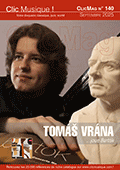 Au milieu du XVIIIème siècle, à la cour d’Espagne de Ferdinand VI, se côtoient la reine Barbara de Bragance claveciniste émérite, Domenico Scarlatti ou la star Carlo Maria Broschi alias Farinelli. Excusez du peu ! Ici pour être précis, nous sommes au Coliseo del Buen Retiro où à l’avant-scène, le violoniste valencien Vicente Baset (1719-1764) mène l’orchestre des seize violons. Il pourrait diriger ses ouvertures comme musiques de scène ou d’agrément de quelques dramaturgies qui n’ont pas franchi le cap du temps. Ces « Symphonies » de 1753, rapportées en Suède par le secrétaire de l’ambassadeur, sont d’un classicisme confondant. L’originalité viendrait d’un cadre immuable ; pièces en trois mouvements et suremploi de la forme sonate. Les castagnettes de rigueurs mises de côté, cela sonne très italien : Baset convoque Vivaldi, le jeune Haendel, Scarlatti père et fils, sans oublier le regretté Pergolesi. C’est beau, jeune, léger, facile, soyeux… Cela s’écoute sans attention, telle une petite musique de fond et Forma Antiqva dirigé par Aarón Zapico y déploie avec un élégant raffinement sa palette d’instruments pour défendre, « con valentía », avec courage, ce presque rien du patrimoine ibérique. (Florestan de Marucaverde)  Discovery of Vicente Baset (1719-1764), composer and violin virtuoso at the Madrid theatres of the 18th century. World premiere recording: First complete edition of all symphonies available today: Baset (also written Basset) composes 12 symphonies, but the scores of only 11 symphonies can be found. The first remains missing. Forma Antiqva and conductor Aarón Zapico impress with a new understanding of historical performance practice. Continuation of the 10-year teamwork between Forma Antiqva and Winter & Winter Baset writes the rare note "Allegro con valentía" at the beginning of his 10th symphony. It seems to be a declaration of intent when it comes to realizing his compositions, which is far removed from the fashion of Italian imitation. A breathtaking, experimental, courageous music that drinks from the theatrical effects of a fascinating time full of chiaroscuro (light and dark). A new work on the European music scene that demands an uncompromising, imaginative interpretation. Courageous! Forma Antiqva, directed by Aarón Zapico, nourished by the best generation of Spanish musicians, deals with the important phase of Spanish Baroque music in an ideal time of growth and development.
 |
